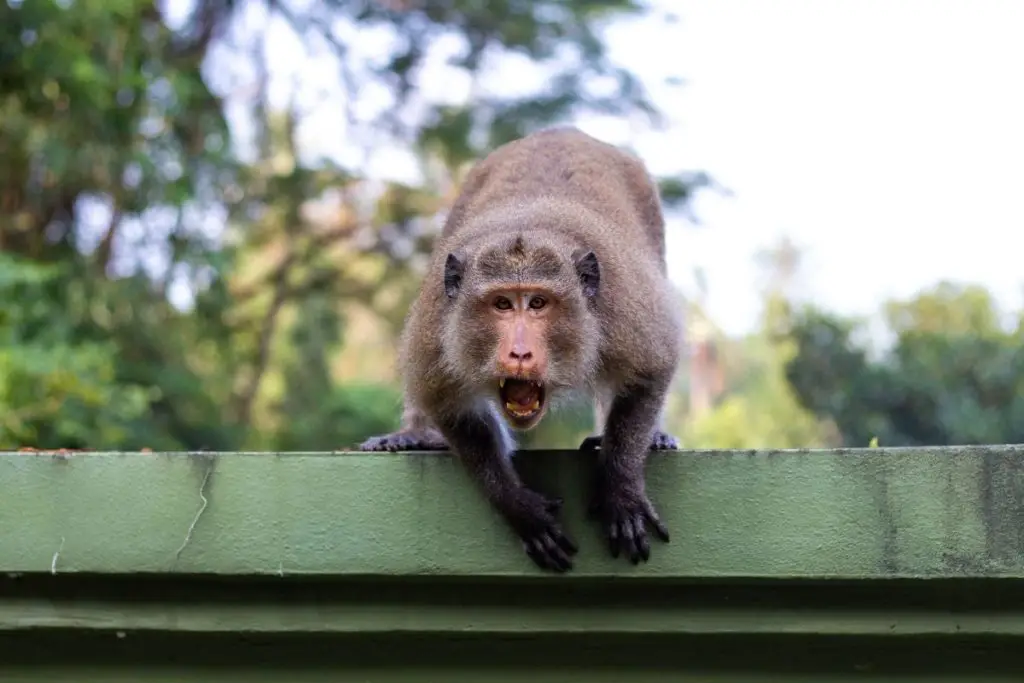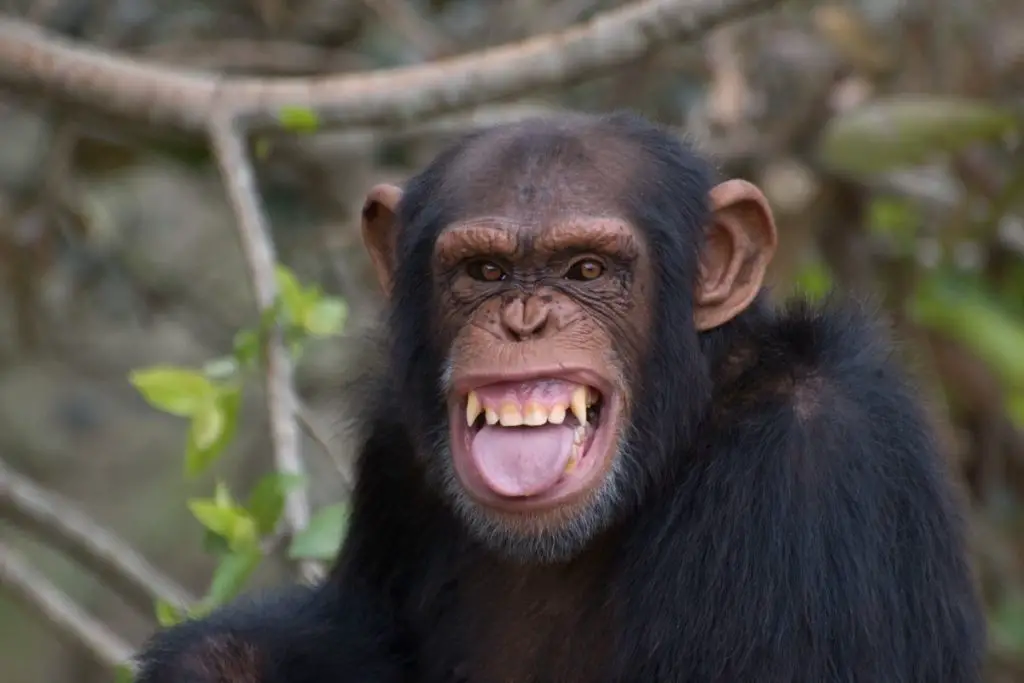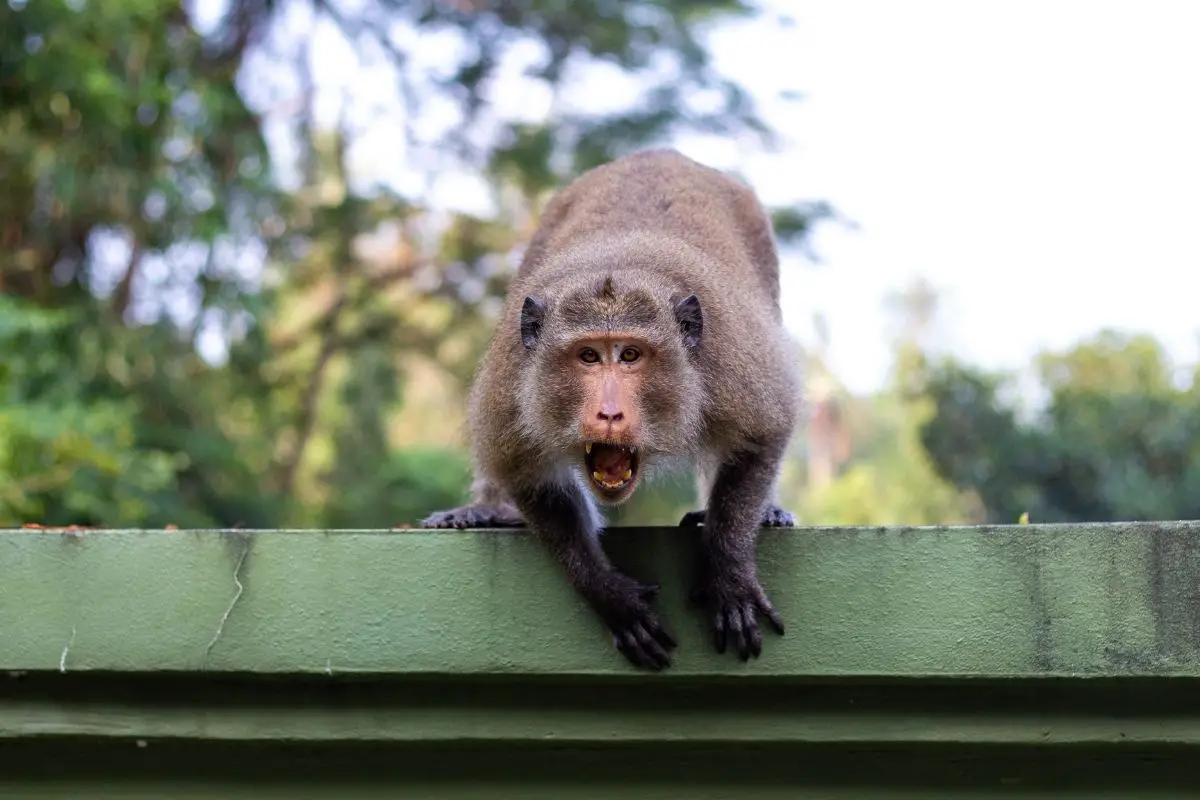Do pet monkeys attack? Do you know the signs of aggression in your pet monkey, and do you know how to train a pet monkey not to attack? These are all important questions that should be addressed before owning any type of monkey. In this blog post, we will answer each question and give tips on what to do if your monkey does become aggressive!
Let’s start with the most important one: Do pet monkeys attack?
Yes, pet monkeys attack when they are stressed, anxious, or to show dominance in the house or for mating purposes. Even the best well-trained monkeys can attack and they can attack suddenly. It’s crucial to know monkey aggression signs and how to train your monkey to be friendly and not attack.
Aggression can be a real issue for monkey owners, and it’s one of the most important things you need to know well how to handle before you even think of getting a monkey.
In this article, we are going to discuss everything about monkey aggression, so keep reading.
Contents
Why do pet monkeys attack?

There are several reasons why do pet monkeys attack. Here are the common ones:
- Monkey feels stressed, anxious or threatened
- To show dominance in your house
- During mating season to show interest for a mate monkey
- Because they think you are withholding food from them.
Monkey attacks are actually rare in the wild. In places with wild roaming monkeys, it’s well known that monkeys can attack people, enter homes, and even do serious damage to peoples’ properties.
Monkey aggression signs

Monkeys will usually attack without showing any warning signs. They will not always shout or scream to scare you the same way dogs use barking to warn you, because dogs are less aggressive to humans than monkeys.
When do monkey aggression signs appear? The first sign of aggressive behavior is that there will be no warning.
Your pet monkey can do all kinds of things like chattering, moving away from you, looking at you, and then attacking. There is no sign before the attack or warning signal is possible.
The most important sign of aggression to watch out for is the baring of the teeth, which unfortunately many people, especially tourists, will mistake for a smile and approach the monkey only to be attacked.
Showing teeth in primates is like showing a gun for humans, it’s a clear warning sign that they are armed and will attack you if you get any closer.
Other monkey aggression signs can include starting and raised eyebrows.
Why you should never smile at a monkey
You should not smile at wild monkeys because:
- It may scratch you when it’s excited
- it may become furious.
- It may scream at you and bite you with its pointed teeth.
- It may grow loud, leap up and bite you
If you smile at a wild monkey, it may interpret your display of teeth as an aggressive signal and respond violently.
What to do if your pet monkey attacks you?
If your do pet monkeys attack, do not try to fight back or scare them. You should do the following:
- Do not scream because it will excite the monkey even more
- Turn around and leave slowly without running away from it. If you run, they may think that you are prey which would make them chase after you faster.
- Protect your face and neck by covering them with a jacket or coat.
- Slowly walk away from the animal, do not make eye contact because you do not want to challenge it. This is where knowing do pet monkeys attack can help you avoid an aggressive situation in the first place!
- If they do bite, do not pull away because it can cause serious damage.
- If you do get bitten by your pet monkey, seek medical attention immediately to prevent infection and disease transmission if the animal is tested positive for rabies.
- You should also report the incident to local authorities so do pet monkeys attacks are controlled in the area.
Monkeys are very opportunistic when it comes to attacking humans because they will take advantage of any situation where you are close enough to them that they think their safety is threatened. They may also do so if they want your food or object that you have.
What to do if a wild monkey attacks you?
If a monkey decides to attack you, there are some tips that can help you prevent the problem from escalating and help you stay safe.
- Do Not try to run away. Monkeys may not smell fear, but they recognize it. Running away makes you look like prey and will only make them more aggressive.
- Open your hands to show them that you don’t have food. Monkeys may attack just because they think you may have food in your hands.
- Back away slowly. Do not look away or turn your back on them, though.
- Do Not scream or try to fight them, you will get hurt.
- If the monkey does take something from you, do not try to get it back. If you let them have it, they will check it for food and most likely drop it after.
- If you do have food, throw it in their general direction but not directly at them.
- If you get injured by a monkey, immediately wash it with soap and water, then find medical attention. Monkeys carry dangerous parasites which can infect humans.
How to train your pet monkey to not attack?
To train your pet monkey to not attack, they will need to be socialized and trained to be docile since a young age. They should be given a good diet and do not need to be mistreated.
Also, do not let them near their feces or urine because it can contain dangerous bacteria like E Coli which could make your pet monkey sick.
Monkeys are social creatures so get more than one if you want them to bond with each other instead of attacking humans.
How to avoid getting attacked by a wild monkey?
The best way to avoid getting attacked by a wild monkey is to avoid interacting with one altogether, but this may not be always possible in places where they roam freely – such as in India, for example.
So, let’s assume you are in the presence of wild monkeys, now how can you avoid getting attacked? Here are some simple precautions to follow:
- Similar to other wild animals: Avoid making eye contact
- Don’t smile; you may think a smile makes you look friendly, but showing teeth is a sign of aggression for monkeys
- Keep an eye on your valuables at all times.
- Don’t wear shiny or jiggly things
- Avoid carrying attention-grabbing items like bags and cameras. The monkey will assume something strange has food in it.
- Keep your distance, of course.
- Remember that even if they are small in size, monkeys are muscular, strong, and can hurt you.
- Do not give them food. At all.
- If you are going to photograph them, remember that a monkey may become aggressive if they see their reflection in the camera lens because they will think it’s another monkey staring right back at them.
- Don’t take your eyes away from the monkey and try to notice any aggression signs like baring teeth or raising their tails.
Conclusion: Monkeys attack, and they’re dangerous
Monkeys do attack, and they are dangerous. If you love monkeys or just want to avoid being attacked by them, it is important to be aware of their behavior.
Monkeys may not have the same body language as humans do so it is best to take care when interacting with one in order to prevent an attack from happening. Do your research before meeting a monkey for the first time!
Helpful Resources
Communicative signals and social behaviour of some African monkeys: A comparative study
If you like this article, please share it!

